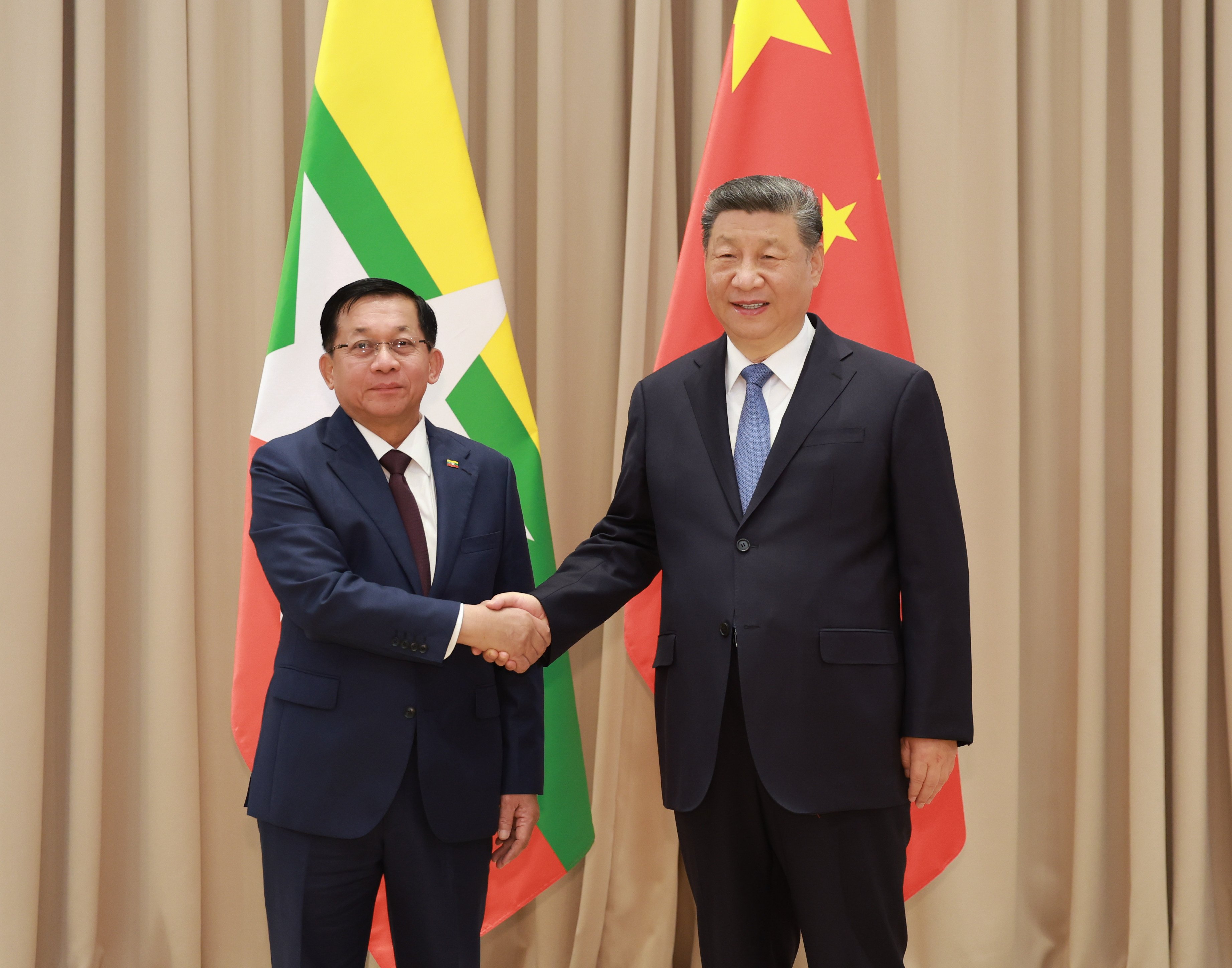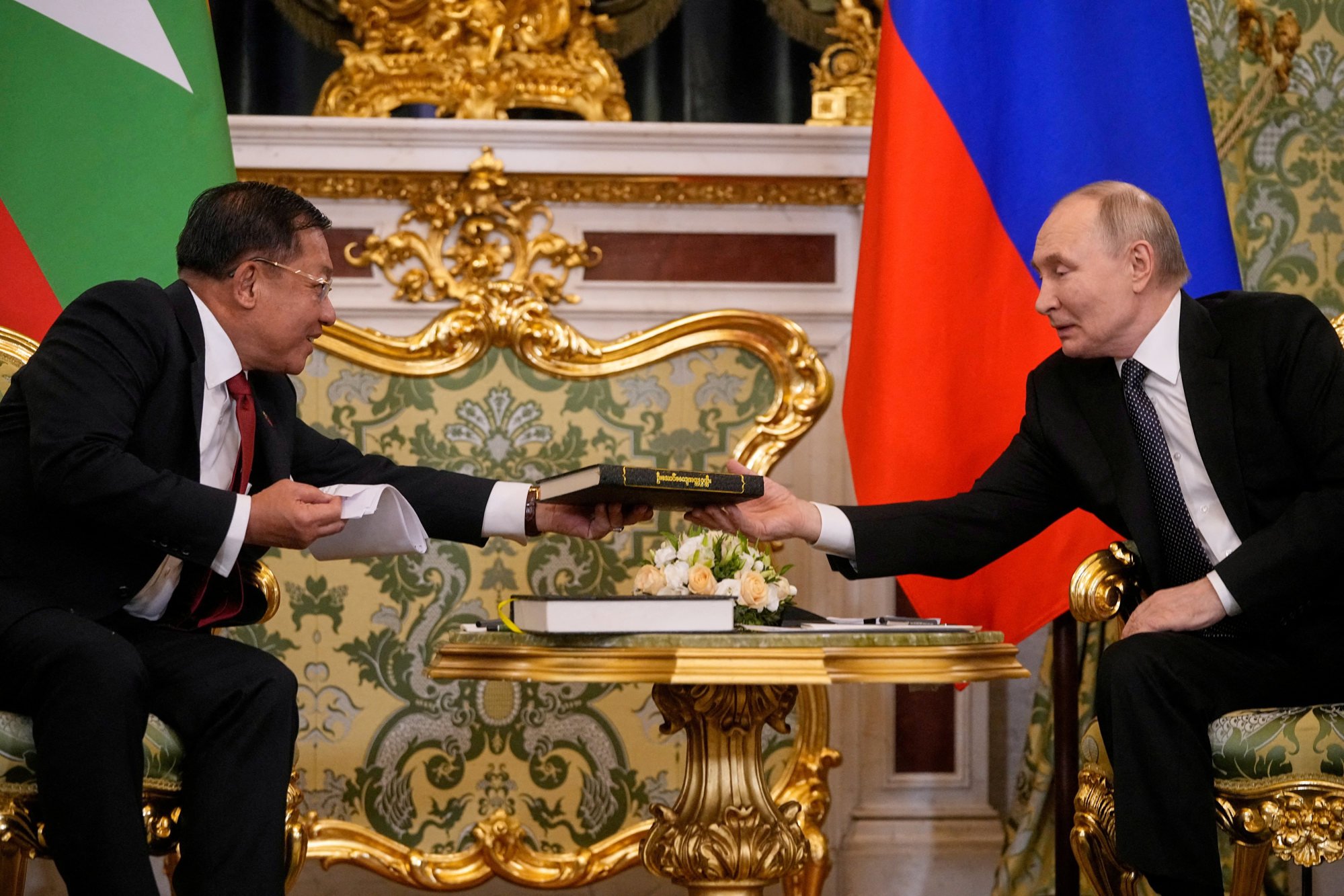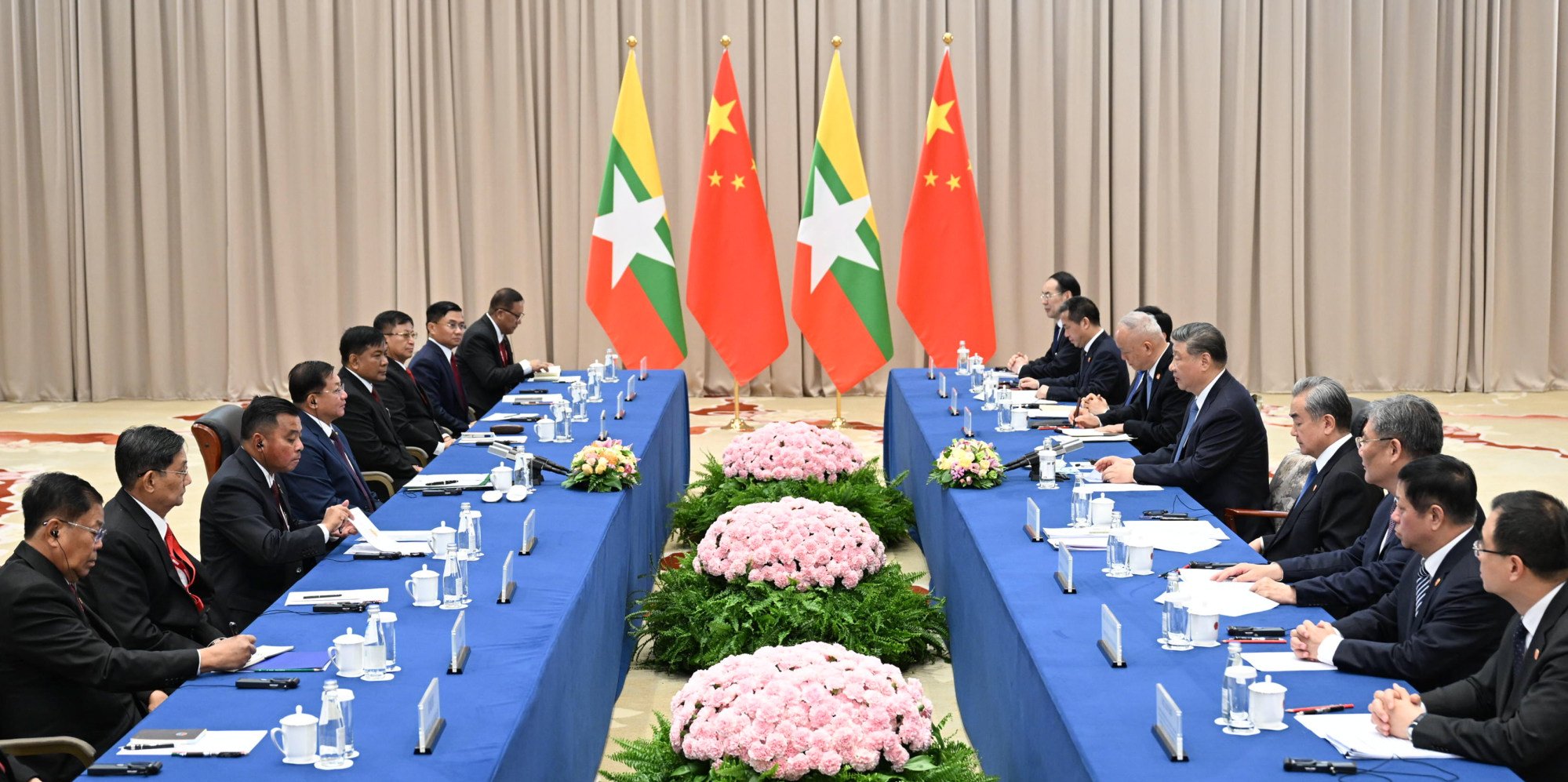Xi Jinping’s meeting with Myanmar’s junta leader in Moscow signals China’s backing of regime
Xi’s meeting highlights China’s increasing support for Myanmar’s isolated regime and indicates a strategic alignment with Russia, analysts say

A rare meeting between Chinese President Xi Jinping and Myanmar’s junta leader has signalled Beijing’s growing support for a military regime widely viewed as faltering and its strategic alignment with Russia in backing the embattled government, according to analysts.
Xi and junta chief Min Aung Hlaing met in Moscow on May 9 on the sidelines of Russia’s Victory Day celebrations. According to Xinhua, this meeting marked the highest-level contact between Beijing and the isolated junta since the 2021 coup in Myanmar, which sparked the country’s civil war, characterised by the military’s struggles against widespread rebellion from ethnic armed groups and newly formed resistance militias.
Chinese state media reported that Xi expressed support for Myanmar in progressing its political agenda and urged the junta “to ensure the safety of Chinese personnel, institutions and projects in Myanmar, and intensify efforts to combat cross-border crimes”.
Jason Tower, an expert on regional security issues, said that after more than four years of avoiding high-level interaction with the senior general, Xi’s decision to meet Min Aung Hlaing showed “China’s growing support for an otherwise failing regime”.
“That the meeting took place in Russia shows growing coordination between Moscow and Beijing around the Myanmar issue,” Tower said.
Russia’s willingness to provide space for the meeting indicated that both China and Russia were “aligned” in their support for the Myanmar military, Tower added.
During a March meeting in Moscow between the junta leader and Vladimir Putin, the Russian president praised the “steadily developing” relationship between his country and Myanmar.

Russia is a crucial arms supplier to Myanmar’s military-led government, which is also looking to expand trade ties with Moscow.
Both Russia and Myanmar are under heavy Western sanctions, Moscow for its 2014 annexation of Crimea and its ongoing war in Ukraine and the junta for the coup and subsequent crackdown on dissent.
The meeting between Xi and the junta leader was likely to “provoke greater anti-China sentiment” in Myanmar, Tower said.
Many local groups have expressed deep concerns at how Beijing had recently pressured ethnic armed groups into handing vast territories back to the military government, he noted.
“Beijing’s growing interference in Myanmar’s domestic affairs has helped Min Aung Hlaing recover slightly from a series of embarrassing defeats on the battlefield,” Tower said.
Even so, the regime continued to experience military setbacks, “demonstrating how it continues to become more dependent on Beijing for its survival”, Tower added.

Zachary Abuza, a professor at the National War College in Washington focusing on Southeast Asian politics and security, said “while there might have been smiles for the camera” the Chinese likely pressed the junta for “tangible progress on the battlefield” to set conditions for elections scheduled for January.
Despite a powerful magnitude 7.7 earthquake that struck Myanmar in March and caused widespread devastation, the junta had continued its military campaign, launching more than 300 air sorties – mostly targeting civilians – and largely blocking aid from reaching areas outside its control, Abuza noted.
Adding that China viewed elections as “an off-ramp” for the junta, Abuza said Beijing knew that the military government could not win the war, hence the need to find a “political solution” for the generals.
“For China, the opposition winning provides a lot of risks – at best it would be a messy federal democracy, and at worse, it could be a long-running civil war,” Abuza said.
Beijing therefore wanted “a degree of military representation” in a future post-junta government, he added.
“China is agnostic on regime type, but they care about two things: security and stability on their borders, and the protection of their economic interests,” he said. “Min Aung Hlaing is incapable of delivering either.”
In recent years, China had hoped of building the ambitious China-Myanmar Economic Corridor (CMEC) under the auspices of the Belt and Road Initiative.
Running from the port of Kyaukphyu in Myanmar’s Rakhine state on the coast to the city of Muse on the Chinese border, the corridor is expected to cost more than US$15 billion, run over 1,000km, and cross several lines of control in the country’s civil war.
However, fighting since the coup has severely disrupted its progress, with the centrepiece Muse-Mandalay railway line reportedly being put on hold.
Mikael Gravers, associate professor emeritus at Denmark’s Aarhus University specialising in Myanmar, said Beijing was worried about its belt and road investment as the Arakan Army – an ethnic armed group – now controlled almost all of Rakhine.
“This means that China’s strategy of the CMEC seems temporarily closed,” he said.
Xi’s suggestion of “advancing Myanmar’s political agenda in a prudent manner” was a reminder, according to Gravers, that the junta ought to secure greater stability before elections.
“Otherwise, voting will be limited to central areas of Myanmar,” Gravers said.
“In Xi’s view, Min Aung Hlaing should establish ceasefires with the groups in the north and northeast – at least,” he said. “But he keeps on bombing civilians. His not so prudent leadership has not impressed Xi.”
Earlier this month, rights group Fortify Rights said the junta had continued to launch deadly air strikes on civilians and civilian infrastructure, despite declaring two temporary ceasefires.
Noting that the air strikes had killed civilians including children, Sai Arkar, an associate at Fortify Rights, said the attacks showed “blatant disregard for human life and international law”.